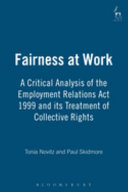
Fairness at work : a critical analysis of the Employment Relations Act 1999 and its treatment of "collective rights"
By - Novitz, Tonia , Skidmore, Paul
Floor
-
Floor 1
Published
-
Hart Pub., Oxford, 2001
ISBN 10 - 1841130834
ISBN 13 - 9781841130835
Book Status
-
4 Qnty Available with us.
Subject
-
Great Britain
Shelf No
-
18
Call Number
-
344.4101 NOV
Physical Description
-
xxxii, 195 pages; 24 cm
Notes
-
Include Bibliography and index.